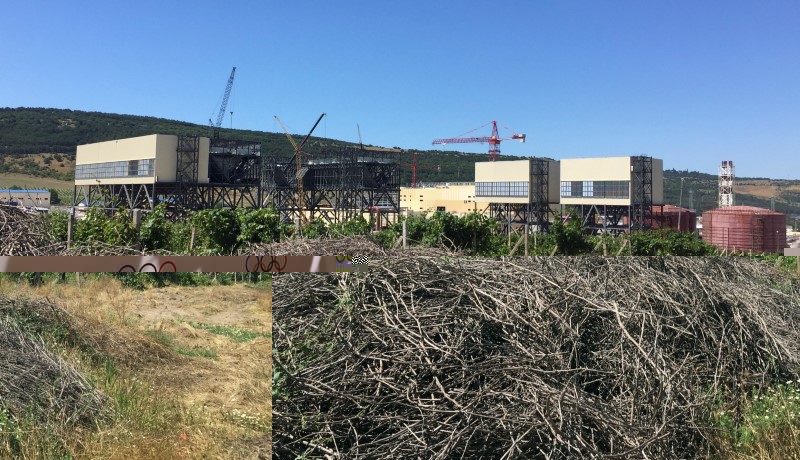By Anton Zverev, Anastasia Lyrchikova and Gleb Stolyarov
SEVASTOPOL, Crimea/MOSCOW (Reuters) - Russia has delivered electricity turbines made by Germany's Siemens to Crimea, a region subject to European Union sanctions barring EU firms from supplying it with energy technology, three sources with knowledge of the delivery told Reuters.
Reuters was unable to determine if Siemens knew of or condoned the equipment transfer, but the move exposes the German company to potential accusations of indirect sanctions-busting and of not taking sufficient safeguards to ensure its equipment does not end up on territory most countries view as illegally annexed, say legal experts.
"Siemens has not delivered turbines to Crimea and complies with all export control restrictions," said Wolfram Trost, a spokesman for Siemens in Munich, when asked to confirm the turbine transfer to Crimea.
Citing client confidentiality, he did not answer written questions asking whether Siemens was aware that the turbines had been shipped to Crimea and whether it would now be activating or servicing them.
Russia needs the turbines for two Crimean power plants the Kremlin wants to get up and running to fulfill a promise, made by President Vladimir Putin, to ensure a stable power supply for the region's residents after it was annexed by Moscow from Ukraine in 2014.
Delivery of the turbines, intended for the two new power stations under construction, had been delayed for over a year because the firms involved feared violating EU sanctions, people involved in the project have told Reuters.
Russia's Energy Ministry, which oversees the Crimea power plants project, declined to comment. It referred questions to Technopromexport, the Russian state-owned firm which is building the plants. Technopromexport declined to comment.
One source close to the project, who spoke on condition of anonymity because of the sensitivity of the topic, told Reuters that two of the turbines had been delivered from Russia by sea to Crimea.
He said they were destined for use in a power plant in the Crimean city of Sevastopol. He said the turbines were unloaded at Sevastopol port, and that preparatory work was underway at the power plant site to install and commission the turbines.
The turbines were SGT5-2000E gas turbines, he said, a type manufactured only by Siemens and its subsidiaries.
RUSSIA OR CRIMEA?
An official in Crimea's energy sector who is familiar with the power plants project, and an employee with a company involved in the project, also said the turbines were Siemens turbines, and that they had been delivered to Crimea.
EU sanctions bar European individuals and companies from providing energy technology to Crimea or from taking any actions designed to circumvent those rules due to the bloc's view that the peninsula was illegally stolen from Ukraine.
Legal experts say there are no court precedents to say whether Siemens could be held responsible if a third party brought the turbines to Crimea.
When asked about the matter, the European Commission has declined to comment on the Siemens case in the past, saying it is up to EU member states to enforce sanctions rules on their companies.
When asked about the issue on Wednesday, a spokesman for German's Ministry for Economic Affairs said he had no immediate comment.
The individual close to the project and the official in the Crimea energy sector told Reuters the turbines delivered to the port in Sevastopol had come from Taman, located in southern Russia, some 10 miles (16 km) from Crimea.
Siemens told reporters in March that a Russian joint venture in which it has a majority stake supplied turbines for use in a power plant that was planned for construction in Taman. [nL5N1GT60D]
The joint venture, Gas Turbine Technologies LLC, made the turbines that were sent to Taman at its factory in the Russian city of St Petersburg.
Siemens has a 65 percent share in the joint venture, and Russian company Power Machines has a 35 percent stake.
The sanctions barring the supply of energy technology to Crimea do not apply to the Taman project because it is located on internationally recognized Russian territory.
The turbines for the Taman plant were bought by Technopromexport - the same company building the two Crimea plants - because, it previously said, it would be building the plant in Taman.
Sources close to the Crimean project have previously told Reuters that one of the options under consideration was to use the Taman turbines in Crimea.
Asked about that possibility last year, Siemens said it was supplying the turbines only for use in Taman, and not in Crimea.

It said at the time it had "no reason" to believe the turbines would be diverted to Crimea, and said it respected and would abide by the sanctions regime.